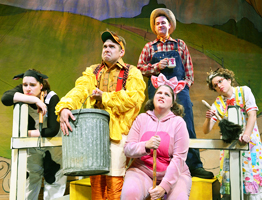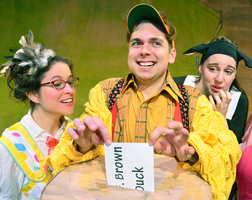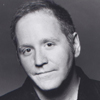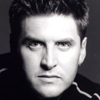From Chicago Theater Beat
‘Duck’ wins by a landslide!
October 25, 2012
By Joy Campbell
FOUR STARS
Farmer Brown has a problem: he’s worn out from running his farm alone. He assigns chores to Pig, Hen, Cow, and Duck so that they can help pull their weight, but this does not go over well, so the animals decide to vote on who gets to run the farm. Duck wins with a platform of giving everybody what he wants, and so begins his political journey and education on the hard job of leadership and keeping promises.
In adapting the children’s book by Doreen Cronin and Betsy Lewin, Jim Grote injected an educational element, using the story as a vehicle for informing kids about political process and civic duty. “It was very important to me to teach that to kids,” Jim told me.
In the current political season, it could not be better timed.
An extremely witty, fast-paced script and catchy songs help tell the story of slacker Duck’s increasingly burdensome struggles as he goes from leading the farm to running for governor (I may never be able to hear the word “gubernatorial” again without giggling), and finally, running for president. He is encouraged all along by Rasputin-like Pig, eager to be the power behind the power, whose explanations to Duck about leadership provide many of the lessons learned. Keeping it fun and interesting, the animals teach Duck, and by extension, us kids, why people vote in a democracy, and what happens in a campaign, and why. In a segment that I particularly liked, Hen gives a darling explanation of why every vote counts. (OK, they avoid the whole electoral-college discussion, but that’s probably for the best.)
Duck learns that being in charge is a lot more hard work and responsibility than it seems; it is not all “sparkle ponies and rainbows dipped in sunshine.” Pig — well, no spoilers here.
The script is delightful. In writing the book and the songs, Jim Grote and George Howe seemed to have as much fun creating the work as we do enjoying it. They never talk down to the kids (there are words like “quadruped” and “tympani”), and they remember that about half of their audience will be the adults who accompany the children. As with all truly brilliant kids’ entertainment (hello, Muppets), the material entertains thoroughly on more than one level. So when Duck does his Nixon impression and the animals spoof the famous “phone call in the night” from the last presidential race, and Duck’s profound comment on the economy is “the economy is stupid,” the adults understand the cleverness of it all, and the kids — well, the kids just think it’s funny.
The cast is outstanding and immensely likeable. As Duck, Nathaniel Niemi is sweet and earnest, the kid in all of us who just wants to play, and who gets in over his head. In a nod to another animal farm, Heather Currie’s Pig is the brains behind the scheming, and is the funniest sow ever. Amy Malcolm’s Cow is the dryly amusing cynic, and Amanda Link’s Hen is the sincere centrist who votes for Farmer Brown, bucking popular pressure. Derek Czaplewski plays Farmer Brown as well as other, minor human characters, and is the perfect straight man to the animals’ naively misguided zeal for change. As an ensemble, the cast members have terrific chemistry, impeccable comic timing, and fantastic singing voices.
Joanna Iwanicka’s simple but effective set looks like a huge coloring-book Farmer’s Almanac, and pays tribute to the book’s author and illustrator. Simple props echo the cartoonish nature of the story.
I watched the kids in the audience, including a few who were particularly antsy before the show, and to a child they were enrapt. If you have a child in your life, bring them. If you don’t, go anyway. You’ll have a blast.
From Time Out Chicago Kids
October 31, 2012
By Jonathan Messinger
The election is just a week away, which means our airwaves are consistently befouled by that nefarious fall creature: the political ad. I can remember being a kid and watching the ominous commercials, feeling bewildered by the divide between the sleazy aura of a political ad and the general importance and reverence people held for political offices. Hey, I was a naïve kid. Still, the political process has to be befuddling maze to the young.
As far as political primers for the lunchbox set go, a kid could do far worse than catch Lifeline Theatre’s Duck for President, written by Lifeline ensemble member James E. Grote, adapted from Doreen Cronin’s book of the same name. In it, a duck named Duck (Nathaniel Niemi) decides he’s fed up with the chores Farmer Brown demands of his animals, so he mobilizes a pig, a hen and a cow to vote him in as farmer. Once he’s ascended to the throne, however, he discovers that being a farmer is a difficult job — so he runs for governor, squeaking out a victory at the state level. Again, confronted by the demands on his time, the lazy duck instead runs for president.
Cronin’s book is a pleasant little comedy fairly devoid of any lessons about politics (except that playing the sax on late-night TV might help a guy’s chances). Grote, however, adds heft to the comedy, slipping in civics lessons with a light touch, along with songs extolling the virtues of working hard. And unlike most political campaigns, there is charisma among Duck’s staff, with the scheming Pig (Heather Currie), the energetic Cow (Amy Malcolm) and the moral Hen (Amanda Link). The songs are catchy, and the for-parents one-liners Grote slips in amid short lessons on how to vote had me laughing. The general pattern of story wears a little thin toward the end, but Grote recognizes that, so each progression up Duck’s political ladder is shorter than the one before. The play is for ages five and up, and given the general silliness of the animals, I’d say it caps out at about seven years old.
From Stage and Cinema
WHEN POLITICS GO FOWL
October 23, 2012
By Sally Jo Osborne
All aboard! Duck is hitting the campaign circuit so be kind to your web-footed friends by taking the family out to see Duck for President; meanwhile, don’t forget to vote. Based on the popular 2004 bestseller by Doreen Cronin and Besty Lewin, Lifeline brings the farm to life in this quirky and quacky show adapted by James E. Grote from the children’s book of the same name by Doreen Cronin; directed by Shole Milos, with music and lyrics by George Howe.
When the animals in Farmer Brown’s (Derek Czaplewski’s) barn decide to protest their daily chores, a democracy is formed and an election is soon underway. “Why does Farmer Brown have to be in charge?” a devilishly charming duck named Duck demands to know. Duck (Nathaniel Niemi) decides he will become get himself elected head farmer and dispense with all these tedious chores. One of his campaign promises is that there will be a pizza night every Tuesday.
A very smart and clever Pig (Heather Currie) is all for it. She is a big believer, and eventually becomes Duck’s campaign manager. In “Hitch Your Wagon to a Star,” a snappy song, she explains how not only Duck, but she (Pig) will get into the spotlight, which is where she wants to be. Hen (Amanda Link) on the other hand doesn’t get her feathers too ruffled; she thinks Farmer Brown is doing a fine job. Cow (Amy Malcolm) is the cynic of the herd and doesn’t hold back on her opinions. In fact she makes the rules about voting: No kids (or calves, chicks, ducklings, etc.), a valid ID is necessary, and all voters must live on the farm.
Duck claims to be an honest politician, and is even heard to insist, “I am not a crook!” I think we have all heard that before. There are a lot of funny references made throughout the show that the kids won’t get, but the grownups will laugh out loud. (My personal favorite is: “Read my beak.”)
Duck wins the election and becomes head farmer, but soon finds out the grass is not always greener on the other side, so he moves on to even greener pastures by running for governor and later for president. There are a lot of lessons for our future voters contained within this show. What is an election? What is a democracy? What is a debate? Why does every vote matter?
Czaplewski plays multiple roles, and is quite entertaining, especially as a woman governor who is Duck’s running mate. The songs are upbeat and at times a bit reminiscent of Will Roger’s Follies. The set is simple and is completely utilized; the costumes are clever enough for us to believe and identify which all the characters.
My five year old daughter enjoyed this show as much as I did, and it completely kept her interest. Anyone younger than five would probably be better served staying at home to watch The Wiggles. With the 2012 election right around the corner, the show is, of course, both timely and educational. There may be just a bit more understanding about why we vote (and how to decide who to vote for) in our household. As duck said during his campaign speech, “Vote for me because the economy is stupid.” He might just have something there.
From Time Out Chicago Kids
Duck for President | Interview with writer James E. Grote
October 23, 2012
By Jennifer Suh
With the final presidential debate in the bag and the election just a couple weeks away, tiny political junkies will have to hit Lifeline Theatre to get their fix of the political stage. Lifeline has opened its anniversary season with a KidSeries musical based on Doreen Cronin’s award-winning 2004 book, Duck for President. Ensemble member James E. Grote adapted the book, updating the Clinton-playing-sax jokes to make it more contemporary. We sat down with Grote to talk politics, ducks and the politics of theatre.
Tell me a little bit about Duck for President.
First of all, it’s just fun. Duck, the one who runs for the president, is a troublemaker. With Duck for President, I wanted to really put in, in a fun sort of way, civics lessons about what an election is, how do we go about it, and how do we keep elections fair. There are lessons in the show, but it’s not an educational filmstrip. A large part of it is [thanks to composer] George Howe. His music is really great in the show. He’s a terrific composer and lyricist.
How did you deal with political references in the original book?
In one of Duck’s TV advertisements, he says, “And don’t forget that economy is stupid.” You know, it doesn’t make fun of anyone. It’s just referencing back to that slogan. It was important for me not to insult either side of the aisle, but just to have some jokes for the parents who remember previous elections.
Is it difficult to expand a short children’s book into a 45-minute show?
It’s a challenge. When I first brought [Cronin’s] Click, Clack, Moo to the ensemble in 2001, we all reviewed the books and talked about it. They were not confident that I could adapt it, but I was able to. Children’s books often start with the problem, whereas in plays, I need to spend some time doing the set-up, introducing the characters — the introductory stuff.
You worked as a part of the artist-in-residence program at Kilmer Elementary School as a theater/drama teacher. How was that experience for you?
What I love about it is that you’re the “fun teacher.” I oftentimes was working with English-as-second language students, which in Rogers Park is not just Spanish-speaking students. It’s Eastern European students, African students — the schools that we teach at in Rogers Park are very multicultural. The joy of it is watching the kids, especially the shier kids, just come out of their shells, getting excited to stand in front of the class and perform.
The U.S. Department of Education recently reported that availability of theater classes has decreased within the past 10 years. What do you think about this trend, and why do you think theater education is important?
Unfortunately, the arts are often seen as extra, as an elective. I think that when it comes to budgets, the arts are the first thing to go. One important thing about theater education is getting kids ready to perform in front of a group of people for whatever reason — whether that’s public speaking, actually being in a play or appearing in a reality show. Standing in front of a group of people speaking, performing or presenting is an important skill for everyone to learn in many, many jobs they may have.
